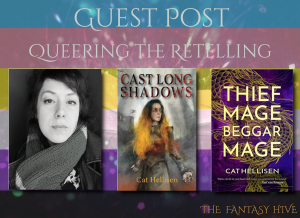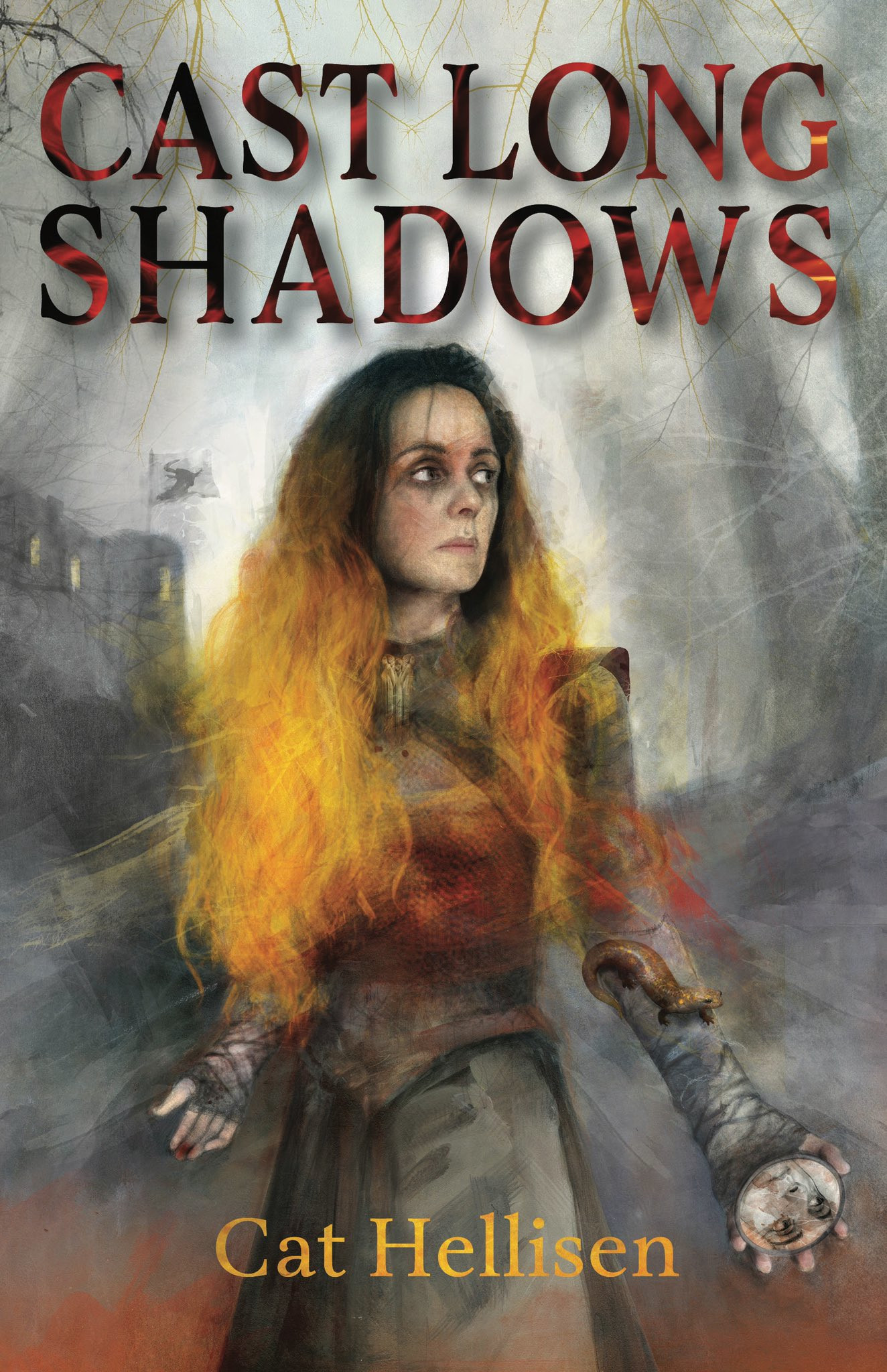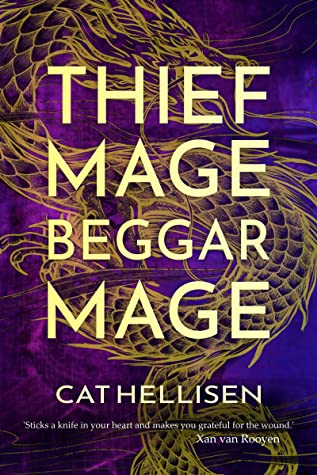Queering the Retelling: GUEST POST by Cat Hellisen
Today, we’re super excited to welcome Cat Hellisen back to the Hive.
They’re here today with an exploration of fairy tale retellings, something we’re rather partial to here! Read on to discover how Cat approached retellings in their latest novel Cast Long Shadows, and their upcoming novel Thief Mage, Beggar Mage…
Queering the Retelling
by Cat Hellisen
When I tell people I’m a fan of retelling fairy tales and folk tales, I’m not being entirely truthful. I usually remember this when I blissfully go on to read or watch their recommendations and realise I needed a qualifier.
I want retellings that unfold the story in a completely different way.
I’ve spent my whole life reading fairy tales, I grew up on them, and they shaped how I view stories, tropes, and characters—their imagery colours how I read other people’s stories and how I write my own.
Conversations vs. Echoes in Fairy Tale Retellings
No matter how beautiful the writing may be, I’m not keen on retellings that are, beat for beat, the same story as before. I’m left deeply disappointed when authors tackle retellings only to do nothing new with the story.
Stories are conversations, a commentary on, and a dialogue with all the narratives we read and watch—an ever-evolving thing. When stories repeat, it’s no longer a conversation, only fading echoes. There is no more forward motion.
So, when I say I love retellings, what I mean is I love stories that engage with, confront, and play with those well-worn narratives in new and interesting ways. I want to read stories that pull the bones out of the old carcasses of fairy tales and build fascinating new monsters with them. Dress them in shining skins, give them horns and wings.
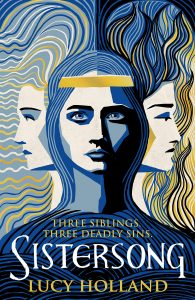 What Makes a Fairy Tale Retelling Interesting?
What Makes a Fairy Tale Retelling Interesting?
One way of shifting retellings is to queer them. I love when writers play with the gender and sexuality dynamics of stories. As a pan non-binary person, I fully admit I love it when we have gender swaps or narratives are shifted to view the world through a queer lens. Whether that is sapphic, gay, non-binary, or any combination of All the Things, it makes me happy to read a story where I can see more of my world and likes reflected back at me.
What makes a retelling interesting is when the original story/song/tale doesn’t inform the final narrative structure and plot arc of the new story but when it provides the seeds of a tale that is entirely its own. Or that approaches the story from a new perspective and invites the reader to challenge their preconceived thoughts based on earlier versions.
An excellent recent example is Lucy Holland’s Sistersong, which takes one of my favourite folk songs (the Twa Sisters, or Bows of London) and completely reinvents it, creating a lush, believable folklore where the magic is subtle and strange. It also seamlessly folds a trans sibling into the story, making it powerful in another way.
Choosing Stories for Retellings
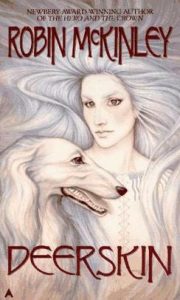 While some fairy tales are so well-known that they are part of our collective cultural lexicon – Beauty and the Beast, Snow White, and Red Riding Hood as obvious examples – there are many other stories to explore.
While some fairy tales are so well-known that they are part of our collective cultural lexicon – Beauty and the Beast, Snow White, and Red Riding Hood as obvious examples – there are many other stories to explore.
In a quick search for retellings, invariably, the top hits will be retellings of those and some more recent but out-of-copyright tales such as Peter Pan or Alice in Wonderland. This can make it seem like the pool of stories for retelling is very limited.
Even though folk songs and tales worldwide tend to fall along similar narrative types — look at the Aarne-Thompson Tale Type Index and Child Ballads to get an idea of what I mean — this doesn’t mean you have to limit your stories to only the most well-known.
There are so many tales and songs that provide new fruit to pick. I’m looking forward to more writers branching out to lesser-known stories for their retellings. It will give us new conversations, but it will also introduce readers to those originals that they might never have heard of otherwise. Robin McKinley’s Deerskin is an excellent example of taking a lesser-known fairy tale (Donkeyskin) and recreating it for a new audience.
Confronting the Morality Lessons of Fairy Tales
Not all fairy tales are morality lessons, but it is a motif that threads through many. Sometimes they are warnings about sexual behaviour or disobedience (Rapunzel is a fascinating one here – girl is essentially ‘stolen’ by an infertile witch and kept virginal and safe in a phallic tower, then literally ‘lets her hair down’, and is betrayed by the witch mother figure after she conceives children out of wedlock…lordy sweet lordy I need to dig my teeth into this one day…). Sometimes the stories reward kindness, cleverness, or other good qualities.
But that doesn’t mean we need to accept the overt moralising thread of a story as the dominant one – we can find other, more subversive threads and bring them out. Particularly in a queer context, this can mean completely subverting a story’s original expectations and finding new conclusions.
The world has changed, and we don’t need to play a story through to its original finale. We get to write ourselves brand new endings.
How I Take On Folk and Fairy Tale Retellings
As a writer, I adore retellings because of the space and the toys it gives me to play with. I also get hooked on specific stories and keep coming back to them. Sometimes it’s because they’ve become a motif for my own life (hence my obsession with rewriting trans-skewed poems about The Wild Swans by Hans Christian Andersen) or because their imagery became indelibly inked into my brain (another nod to Andersen with The Tinder Box).
My most recent book Cast Long Shadows focuses on female relationships through how the stepmother is always cast as the villain. I chose Snow White and then ripped it apart, keeping only the parts I wanted. My drive was to show a cast of complicated women trying to survive their little corner of the world and the fragile magic they use both for and against each other.
But in terms of queering retellings, my next book, Thief Mage, Beggar Mage, takes on my darling Tinder Box and completely reinvents it to suit. I wanted a story filled with magic, pain, intrigue, lies, dragons, and drugs. Thief Mage was my chance to play with how we present ourselves and our gender.
The Future is Bright
With more and more LGBTQIA+ writers making their mark in speculative fiction writing, I’m hoping to see many fresh takes on old stories, especially as queer writers engage with the stories that shaped them and interrogate traditional takes.
Putting it like that sounds very academic, which is not what I mean. I am excited to see people play, smash and twist things, and rebuild new wonders from the glittering shards.
Cat Hellisen writes weird, lush speculative fiction. They are the author of eight novels, and their latest novel Cast Long Shadows from Luna Press, was released in June 2022.
Their short stories and poems have been published in Tor.com, The Magazine of Fantasy and Science Fiction, Apex Magazine, Shimmer Magazine, Shoreline of Infinity, and several speculative anthologies. They are the winner of Short Story Day Africa for their story, The Worme Bridge.
Cat lives in Scotland and spends way too much time watching figure skating when they should be walking their dog. (According to their dog, anyway.)
